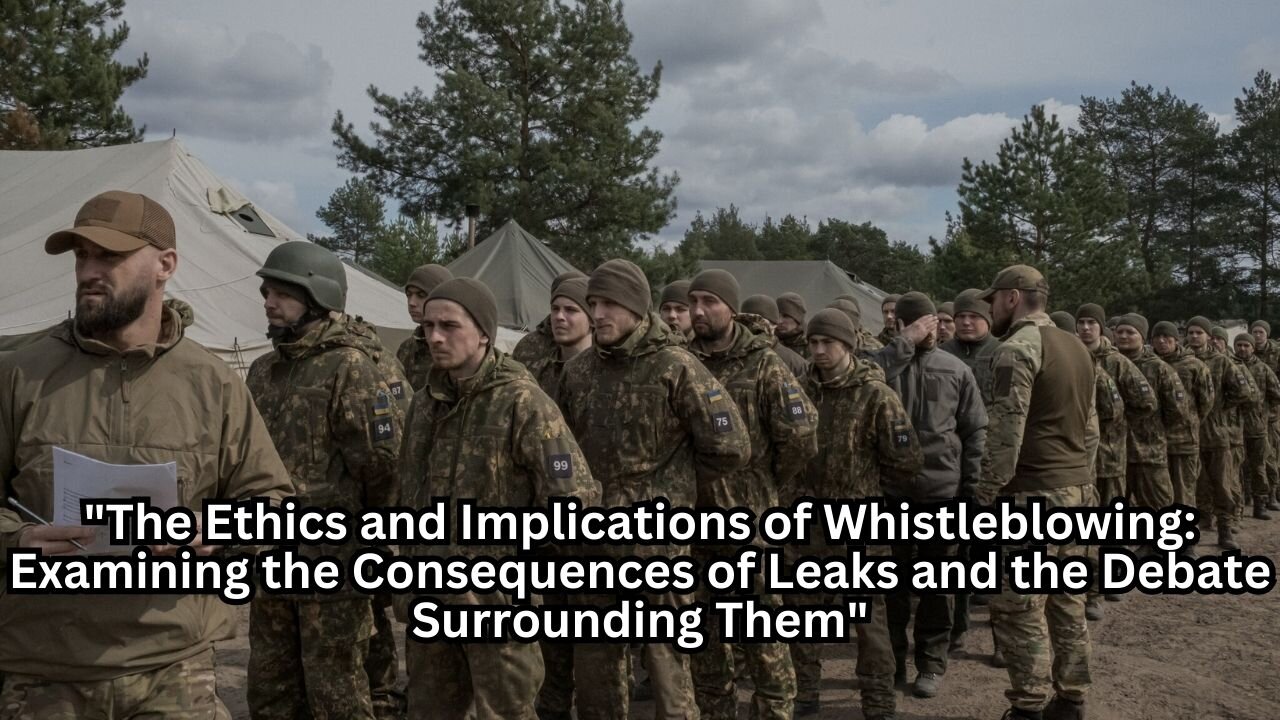Premium Only Content

"Examining the Consequences of Leaks and the Debate Surrounding Them"
Massachusetts Air National Guardsman, Jack Teixeira, was arrested for leaking highly classified military documents. The documents contained assessments on the war in Ukraine, the capabilities and geopolitical interests of other nations, and other national security issues. This article provides detailed information on how Teixeira was identified and arrested by the authorities. Billing records from the social media platform Discord and interviews with individuals familiar with his online activities helped the authorities locate Teixeira, who used his government computer to search for the word "leak" on the day media reports revealed that classified documents had been improperly disclosed. The article also reveals that Teixeira was the leader of an online private chat group on Discord, where he had posted classified information, and that he had a top-secret security clearance. Teixeira is facing charges under the Espionage Act for unauthorized retention and transmission of classified national defense information. The article concludes by mentioning that the Biden administration is taking steps to secure and limit the distribution of sensitive information and that the Pentagon is conducting its review to prevent future breaches. ...personal security protocols to prevent any future unauthorized disclosures.
The leak of classified military documents is a serious national security breach that can potentially harm the United States and its allies. It is reassuring to see that law enforcement agencies were able to swiftly identify and apprehend the suspect responsible for this leak. However, it is concerning that such sensitive information was able to be accessed and leaked in the first place, highlighting the need for continued vigilance in safeguarding classified information.
In conclusion, the arrest of Jack Teixeira in connection with the leak of highly classified military documents is a significant development in this case. The use of billing records and interviews with social media comrades to pinpoint the suspect highlights the growing importance of digital evidence in criminal investigations. The Biden administration's efforts to contain the fallout from the leak and reassurance to allies and partners are commendable. It is essential to continue to strengthen security protocols and safeguard classified information to prevent future unauthorized disclosures. There have been several high-profile leaks in the United States in recent history, particularly involving government agencies and national security.
One of the most famous leaks was the case of Edward Snowden, a former National Security Agency (NSA) contractor who leaked classified information about the agency's surveillance programs in 2013. Snowden's disclosures revealed the extent of the NSA's surveillance activities, including the collection of phone and internet metadata on millions of Americans. He fled to Hong Kong and then to Russia to avoid prosecution by the US government. Subscribe for more content like this.
Another notable leak was the release of classified documents by Chelsea Manning, a former Army intelligence analyst, to WikiLeaks in 2010. Manning leaked hundreds of thousands of documents, including military and diplomatic cables, which exposed US government misconduct and human rights abuses. Manning was convicted of several charges, including violations of the Espionage Act, and served seven years in prison before her sentence was commuted by President Obama.
More recently, Reality Winner, a former NSA contractor, leaked classified documents to the media in 2017 that detailed Russian attempts to interfere in the 2016 US presidential election. Winner was sentenced to five years in prison for violating the Espionage Act.
These cases, among others, have raised questions about the balance between national security and individual rights, and the role of whistleblowers in exposing government wrongdoing. After a leak of sensitive information occurs, the US government typically launches an investigation to determine the source of the leak and to assess the potential damage caused by the disclosure of the information. Depending on the severity of the leak, various actions may be taken.
If the leak is determined to have been caused by an individual with security clearance, that individual may face disciplinary action or criminal charges. In some cases, the government may also take steps to improve its security protocols and to increase training and awareness among personnel.
If the leak is determined to have been caused by a foreign government or other external actor, the US government may take diplomatic or legal action, such as sanctions or extradition requests. In extreme cases, the government may also consider military action or other forms of retaliation.
Overall, the response to a leak of sensitive information depends on the nature and severity of the leak, as well as the potential impact on national security. The government's priority is typically to prevent further harm and to mitigate the damage caused by the leak. It is difficult to say whether it is the "right" way to handle these types of leaks, as different people may have different opinions on what constitutes the best course of action. However, the government has a responsibility to protect classified information and prevent it from being leaked, as such leaks can have serious national security implications. Therefore, taking legal action against those responsible for the leak is one way to send a message that such behavior will not be tolerated. At the same time, it is also important to ensure that journalists and whistleblowers who act in the public interest are not unfairly targeted or punished. Ultimately, striking a balance between protecting national security and upholding free speech and press freedoms is a complex and ongoing challenge. In summary, leaks of classified information in the US have been occurring for many years and have had significant consequences, including damage to national security and diplomatic relations. The government has taken various actions to prevent and punish leaks, including implementing stricter security measures, conducting investigations, and prosecuting those responsible. However, there is ongoing debate over whether these measures are effective, ethical, or constitutional, and how to balance national security concerns with the public's right to know. In addition to the actions taken by the government and companies to prevent and mitigate leaks, there are also steps that individuals can take to protect their own information. These include being mindful of what information you share online, using strong and unique passwords, keeping software and security systems up to date, and being cautious of phishing scams and other forms of social engineering.
Overall, data leaks are a serious concern in today's interconnected world, and preventing them requires a multifaceted approach involving government regulations, corporate responsibility, and individual action. Thanks for watching, subscribe our channel for authenticity.
-
 40:42
40:42
SouthernbelleReacts
1 day ago $0.08 earned😂 American Pie (1999) Reaction | Iconic Teen Comedy, High School Chaos & 90s Nostalgia 🥧
28.7K4 -
 5:05:02
5:05:02
LumpyPotatoX2
5 hours agoBecome a HellDiver Today - #RumbleGaming
40.5K1 -
 4:52:02
4:52:02
Midnight In The Mountains
7 hours agoGaming w/ PER·SE·VER·ANCE | Sassy Saturday Fortnite | with the Midnights!
29.7K3 -
 LIVE
LIVE
shyboyking
5 hours agoThe Bots Of The Bots !!!😎
166 watching -
 24:06
24:06
True Crime | Unsolved Cases | Mysterious Stories
5 days ago $0.23 earnedShe Traveled Alone… and Never Came Back – 5 Mysterious Unsolved Cases (Part 6)
33.2K6 -
 27:23
27:23
Clickbait Wasteland
19 hours ago $0.07 earnedAsking New Yorkers Who They Support For Mayor: Staten Island
32.5K17 -
 16:58
16:58
World2Briggs
1 day ago $0.06 earnedThe California Rant: Point Blank With No Fluff or BS. California Gold?
20.6K4 -
 17:49
17:49
Chris Harden
2 days ago $0.03 earnedThe Glass Capital That Shattered | The Decline of Streator, Illinois
15.4K4 -
 51:15
51:15
JohnXSantos
3 days ago $0.03 earnedClothing Brand Manufacturers + Winners
8.8K2 -
 10:06
10:06
Cyclops Videos Joe W Rhea
12 days agoHybrid Super 22 Rifle
10.5K1